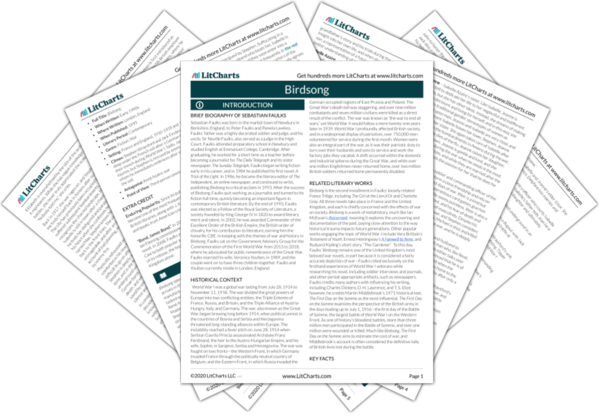Birds are repeatedly referenced within Sebastian Faulks’ Birdsong. They often represent optimism and hope for the future, and also offer a reminder of the indifference of nature to the violence and inhumanity of war. In the darkest days of battle, birds can be heard singing over the trenches, and as the men engage in endless killing, the birdsongs represent life carrying on in the face of mankind’s destruction. Protagonist Stephen Wraysford has a deep fear of birds and is plagued most of his life by a reoccurring dream in which a roomful of birds threaten to peck his face. As an orphan, and later a heartbroken man embittered by war, Stephen resents and fears the life and optimism that birds symbolize. It isn’t until Stephen stops hating and begins to love that his fear of birds begins to subside. Years later, Elizabeth, Stephen’s granddaughter, gives birth to a son she names John—a manifestation of Stephen’s promise to fellow dying solider Jack, whose own son named John had recently died, to have children on his behalf; as she does so, a crow flies across the sky. Crows, often a symbolic of bad luck and death, here represent a sort of guarded optimism within the story. The war is proof of the wickedness of men, and without proper knowledge of the past, society has the potential to repeat the very same horrors.
Birds Quotes in Birdsong
He threw the chestnuts up into the air in his great happiness. In the tree above him they disturbed a roosting crow, which erupted from the braches with an explosive bang of its wings, then rose toward the sky, its harsh, ambiguous call coming back in long, grating waves toward the earth, to be heard by those still living.










